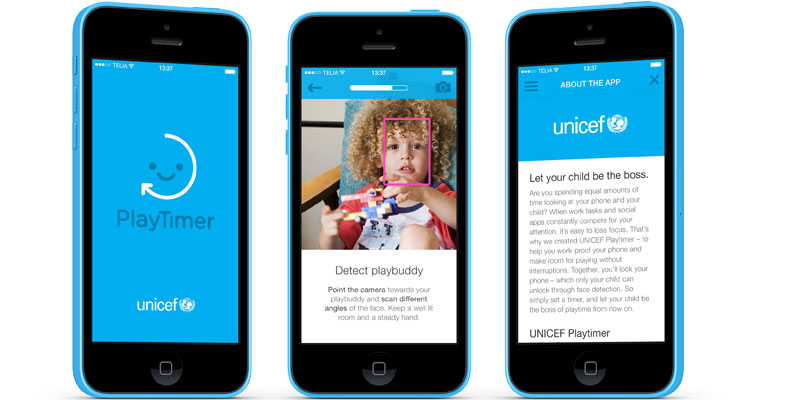Katherine Crisp is Head of Strategy & Innovation at UNICEF UK. Katherine supports the organisational strategic planning and performance management, as well as encouraging UNICEF UK to use innovative approaches in its vision to create a better world for children. Katherine has previously worked in both the private and voluntary sectors and is passionate about innovation with a social purpose.

“…my two year old believes his ‘right to play’ is synonymous with his ‘right to an iPhone’…”
It probably doesn’t come as news that over half of parents take work calls and answer emails outside of office hours and this impacts time with their families. And it’s not just work – apparently we spend more time on our phones than talking to our partners.
Impact our phones have on our availability for our children
Parents spend quite a bit of time debating whether it’s amazing or terrifying that children can navigate a smartphone before they can write,and trying to work out at what age it’s appropriate for children to have their own phone. However we don’t always spend as much time talking about the impact that our phones have on our availability (emotionally and physically) for our children.
Children’s rights to play and quality time with parents
UNICEF believes that both time to play and quality time with parents are important rights for all children. Accordingly we work with companies to raise awareness of the Child Rights and Business Principles – which guide companies on the actions they can take in the workplace, marketplace and community to respect and support children’s rights.
To raise awareness of the impact smartphones have on family life, UNICEF has designed the PlayTimer app, which is designed to enable children to work-proof their playtime. After all, we don’t let children invade the workplace (although arguably this could do a lot for our collective creativity!)
Free of charge app from UNICEF
The PlayTimer app, which is available for iOS free of charge in the App store, allows you to set how long you are going to play for with your child. You then take your playmate’s photo to set the timer. This will ‘lock’ your phone and show a black screen. If the phone is touched in locked mode, an alarm will activate.
You can turn off the alarm by taking another picture of your playmate. (In reality, and in case of emergency, you will still see incoming calls and can make emergency calls, as no app has the power to over-ride phone lock settings).
I loved the idea of an app that reminds you to switch off your phone and stop work (or indeed personal emails, Facebook, Twitter) from interrupting playtime. So it was with some excitement that I got an early version to road-test. We talk a lot about children’s rights at work, including the often overlooked importance of the right to play; here was a light-hearted reminder to put it into practice at home.
Road-testing the UNICEF Playtimer
My first playmate was my nearly five year old. She found the whole process quite amusing; posing happily for a picture and thoroughly enjoying the uninterrupted playtime. I found the app a helpful reminder to focus on her and not drift into work or household chores.
However my two year old believes his ‘right to play’ is synonymous with his ‘right to an iPhone’, which made the whole experience more challenging. Taking his picture involved about three minutes of ‘cheeeeeese’, ‘can I see it?’, ‘wanna see it’, ‘pleeeeeease’ and attempts to take my phone.
We eventually got a picture, set up the app and started ‘playing’. Although this was more like a game of hide and seek with the phone. The plus side being that the Playtimer app had locked the phone so neither of us could get in! I eventually managed to distract him from the phone and we got down to some serious football, chasing and drawing.
So….will I be using the app again?
The obvious conclusion is yes I will be using the app again with my five year old but probably not with my two year old. Most importantly this has made me think more about how I use my phone within the home. So my conclusion is that my phone should stay outside the room whilst I’m with my children – I will still hear it if it rings, but won’t be distracted by the buzz of emails or tempted onto Twitter.
Find out more about the Children’s Rights and Business Principles here:
Find out more about the UNICEF Playtimer app here:
Download the app from iTunes:
https://itunes.apple.com/us/app/playtimer/id872675762?mt=8





